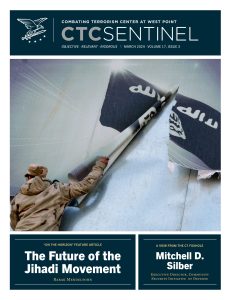From the Editor
In this month’s feature article, Barak Mendelsohn examines the future of the jihadi movement. His article is the second in a new recurring series in CTC Sentinel entitled “On the Horizon” that examines emerging counterterrorism challenges and long-term developments. Mendelsohn writes that over 20 years after 9/11, “jihadi violence in the West is low, but the number of Sunni jihadi outfits around the world has increased. And while the central leaderships of both al-Qa`ida and the Islamic State appear in tatters, many of their affiliates are experiencing expansion.” He argues that “anti-regime grievances, the appeal of religious ideology, and the ability to hurt, are likely to maintain jihadism as a viable resistance ideology.” He further warns that “jihadism is still a powerful force and is making inroads in various regions” and that “a more modest jihadi strategy with a regional focus is offering jihadis a new path forward.” But, he notes, “a sustainable jihadi success would require moderation that is simply antithetical to the nature of the ideology.”
Our interview is with Mitchell D. Silber, the executive director of the Community Security Initiative, an intiative “created by the leading organizations in the Jewish community in New York to protect the Jewish population and Jewish institutions in the Greater New York City metro area.” He previously served as Director of Intelligence Analysis at the New York City Police Department.
Silber describes how in the months since the October 7 attacks in Israel, there has been a surge in antisemitic threats and violence in the greater New York area. “This is kind of like a category five storm. Five times the amount of hateful postings that our intelligence desk had to vet through,” he says, adding that “since October 7, 2023, there have been at least 23 anti-Jewish assaults in New York City.” He outlines how in response to these grave threats, the Jewish “community, leadership, and organizations have rallied, have risen to the occasion, and are now creating the security architecture that we never had before in the United States in order to meet the moment.”
Finally, Caleb Weiss and Ryan O’Farrell examine how Operation Shujaa, launched in late 2021 by the Democratic Republic of the Congo (DRC) and Uganda against the Islamic State Central Africa Province (ISCAP) in the border regions of the DRC near Uganda, has degraded the ability of the group to disseminate propaganda via the Islamic State’s central media apparatus. They write: “While still a serious and deadly threat inside Congo and beyond, [ISCAP’s] propaganda output is a shell of its former self. This decline is, in part, thanks to the current joint Ugandan-Congolese operations against it.”
Paul Cruickshank, Editor in Chief
 Skip to content
Skip to content

